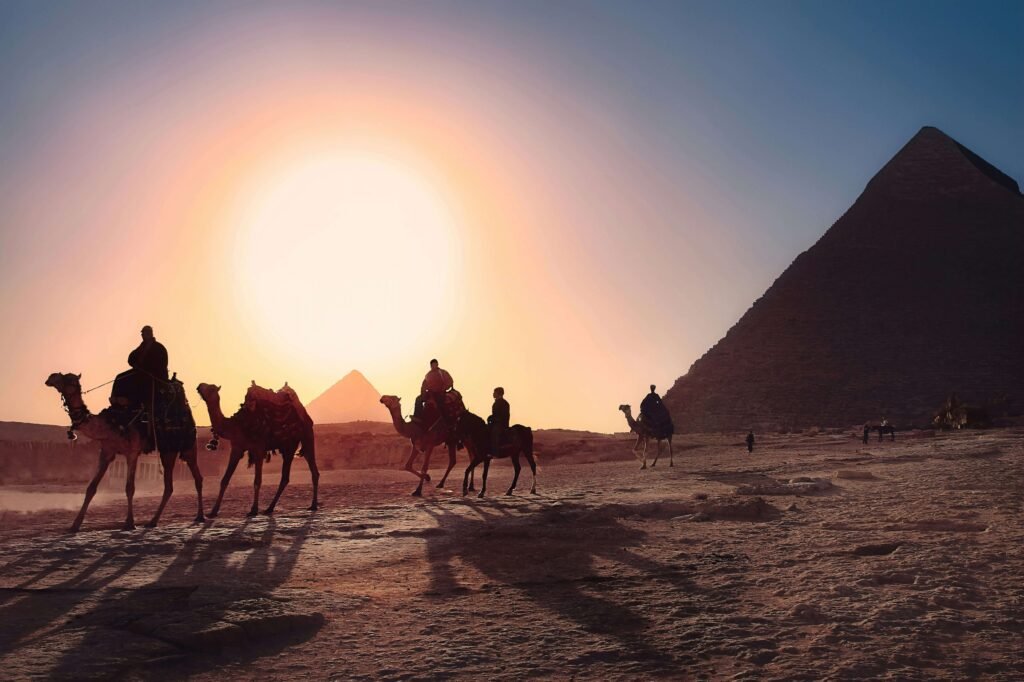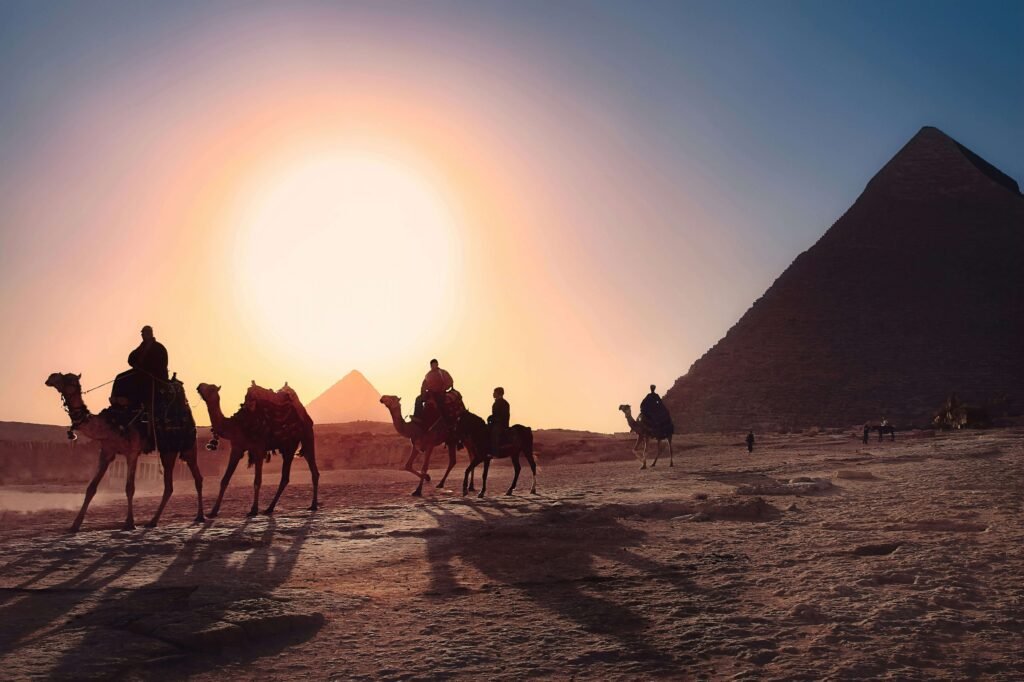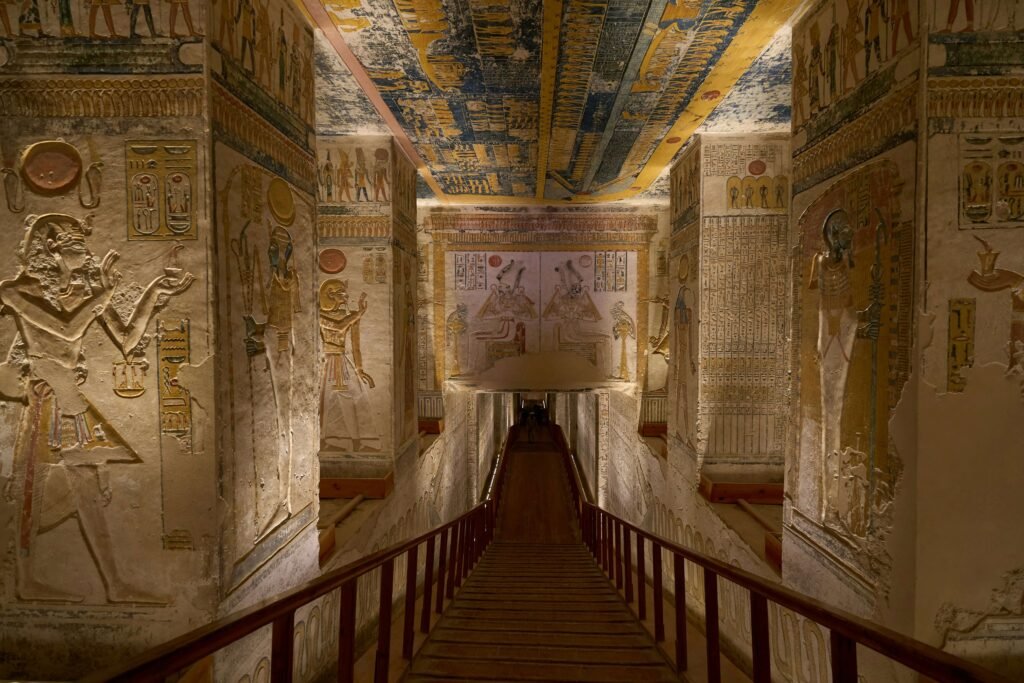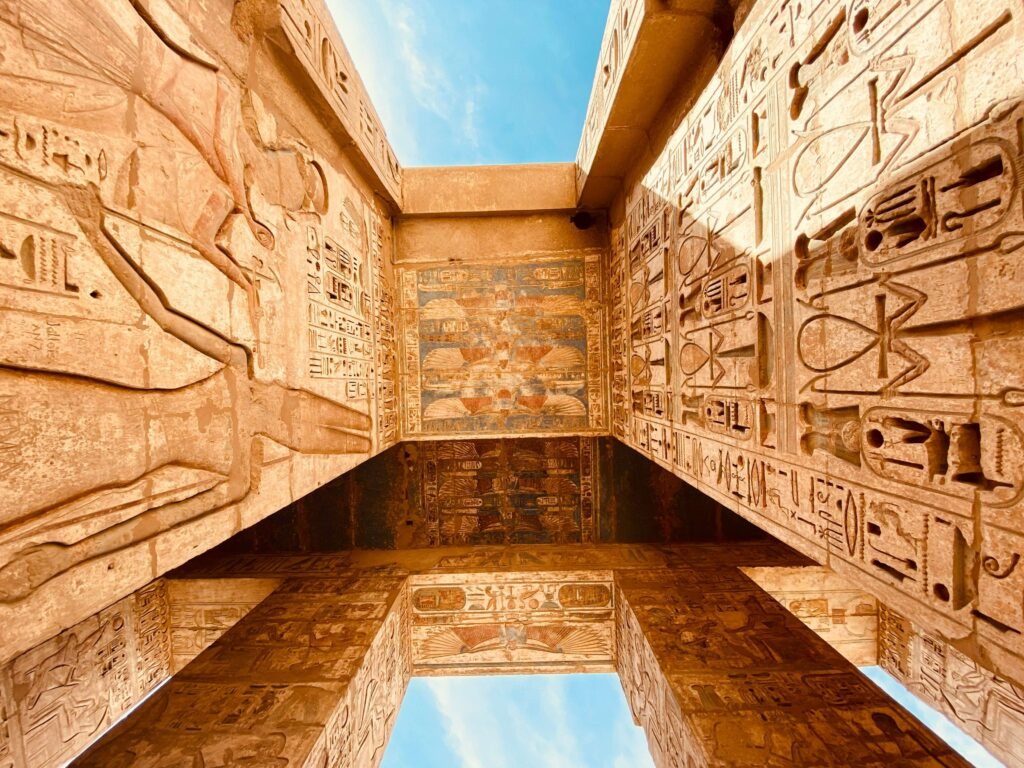Having visited Egypt several times, from the coastal charm of Alexandria to the bustling heart of Cairo, I can confidently say this ancient land is a treasure trove of history and culture. My journeys through the pharaonic wonders and vibrant cities were filled with awe and adventure. Egypt is a beautiful and generally safe destination, offering rich experiences for any traveler. However, solo female travelers should be aware of potential challenges and take extra precautions. Join me as I share insights and tips to help you navigate and fully appreciate the timeless allure of Ancient Egypt.
Table of Contents
Introduction
Egypt is one of the world’s most captivating and fascinating travel destinations. With a history spanning over 5,000 years, Egypt offers an unparalleled combination of archaeological wonders, vibrant culture, stunning scenery, and warm hospitality. Often called the “Cradle of Civilization”, Egypt is where one of the world’s earliest and greatest civilizations was born along the banks of the Nile River. From the Great Pyramids of Giza to the temples of Luxor and Aswan, Egypt is filled with iconic landmarks and monuments that provide a glimpse into its ancient past.
The Egyptian Museum in Cairo houses the world’s largest collection of Pharaonic artifacts, including the treasures of King Tutankhamun. The Nile River has sustained Egyptian civilization since ancient times and a cruise along the Nile provides views of temples, tombs, and rural villages that seem frozen in time. Egypt’s Red Sea coast offers incredible scuba diving and snorkeling among coral reefs and shipwrecks. The bustling bazaars of Cairo and Luxor are filled with handicrafts, spices, fabrics and more. Egypt’s welcoming people, distinct culture, delicious cuisine, and year-round sunny weather make it an unforgettable travel experience. With so much to see and do, Egypt should be on every traveler’s bucket list.
Getting There
Egypt has several major international airports that make it easy to reach from destinations around the world. The main gateway is Cairo International Airport, which handles flights from major carriers like EgyptAir, Emirates, Qatar Airways, Lufthansa, and more. Direct flights are available from European hubs like London, Paris, and Frankfurt, as well as major cities in the Middle East, Asia, and Africa.
Other major airports include Hurghada International Airport and Sharm El Sheikh International Airport, which primarily serve beach resort destinations on the Red Sea. Luxor International Airport is very convenient for visiting famous historic sites like the Valley of the Kings along the Nile River.
Visa requirements vary by nationality – some travelers can obtain a visa on arrival, while others need to apply in advance. Be sure to check current visa rules based on your citizenship before traveling to Egypt.
When to Visit
The best time to visit Egypt depends on the type of trip you want and your budget. The peak tourist season is from October to May when the weather is cooler and more comfortable for sightseeing. However, this is also the most expensive and crowded time.
Peak Season (October – May)
- October – May is considered peak season with the most ideal weather. Daytime temperatures range from 70-90°F.
- The peak months are November – February when temperatures are cooler and crowds are highest.
- Hotel rates and airfares will be most expensive during the peak winter months.
- February and March are popular times for tourists to escape the cold winter weather.
- April and May are also busy as temperatures begin rising toward summer.
Off Season (June – September)
- June – September is off-season with very hot temperatures averaging 90-105°F.
- The summer months will be less crowded at major sites, with cheaper hotel rates and airfares.
- However, the intense heat can make extensive outdoor sightseeing challenging.
- Late August and September will be less crowded as temperatures start to cool down.
To avoid crowds and save money, travel during shoulder seasons in April/May or September/October. For the best weather, visit during peak season from November to March.

Where to Stay
Cairo
Cairo is Egypt’s capital and largest city, making it a convenient base for exploring the Great Pyramids of Giza and the Egyptian Museum. Recommended hotels in Cairo include:
- The Nile Ritz-Carlton – Luxury 5-star hotel on the banks of the Nile River, close to the Egyptian Museum. Gorgeous rooms with Nile views. Full-service spa and multiple restaurants onsite.
- Marriott Mena House – Historic luxury hotel built in 1869, situated right next to the Great Pyramids. Large resort-style pool and lush gardens onsite. Rooms offer views of the pyramids.
- Fairmont Nile City – Modern 5-star hotel located downtown, close to the Nile River. Rooftop pool, spa, and fitness center onsite. Convenient for sightseeing around Cairo.
Luxor
Luxor is located along the Nile River in southern Egypt and is a prime base for exploring ancient sites like Karnak Temple and Valley of the Kings. Top hotel picks include:
- Sofitel Winter Palace Luxor – Historic colonial-style luxury hotel built in 1886, located on the Nile corniche. Offers a large outdoor pool, full-service spa, and views of the Nile. Close to Luxor Temple.
- Steigenberger Nile Palace – Elegant 5-star hotel set within lush tropical gardens. Features multiple pools, tennis courts, spa, and fitness center. Short walk from Karnak Temple.
- Sonesta St. George Hotel – Luxury hotel housed in an art deco-style building dating back to 1929. Rooftop pool and beautiful views of the Nile River. Close to Luxor Temple.
Red Sea Coast
The Red Sea coast offers incredible beaches, snorkeling, and scuba diving. Recommended resorts include:
- Four Seasons Resort Sharm El Sheikh – Ultra-luxury 5-star beachfront resort featuring lavish rooms with sea views, multiple pools, world-class spa, and professional dive center. Located in Naama Bay.
- Baron Palms Resort Sharm El Sheikh – All-inclusive 5-star resort set on a long sandy beach. Offers a large lagoon-style pool, full-service spa, and a house reef for snorkeling just offshore.
- Steigenberger Al Dau Beach Hotel – Located on the Red Sea in Hurghada, this 5-star resort has its own private beach, onsite dive center, spa, pools, and restaurants. Rooms have furnished balconies.
Top Sights
Great Pyramids of Giza
The Great Pyramids of Giza are the most iconic sight in Egypt. These massive tombs were constructed around 2500 BC for the pharaohs Khufu, Khafre and Menkaure. The Great Pyramid of Khufu is the oldest and sole remaining Wonder of the Ancient World. Standing at an impressive 138 meters tall, it’s astonishing to think how these pyramids were engineered and constructed over 4500 years ago. No trip to Egypt is complete without visiting the Great Pyramids and gazing in awe at their majestic size and shape.
The Pyramids are located just outside Cairo in the Giza complex. You can go inside some of the pyramids, though the passages are quite narrow. The panoramic views from the top are incredible on a clear day. The Solar Boat Museum next to the Great Pyramid displays one of the ceremonial solar boats buried near the pyramids.
Valley of the Kings
The Valley of the Kings contains the hidden tombs of many ancient pharaohs and nobles from the New Kingdom period (1539–1075 BC). The valley has over 60 tombs, with the most famous being King Tutankhamun’s tomb discovered in 1922 by Howard Carter. Many of the tombs have exquisite wall paintings and hieroglyphics still intact, providing insight into ancient Egyptian life and religion.
The Valley of the Kings is located across the Nile from Luxor. Visitors can buy a general ticket to enter 3 tombs, while King Tut’s tomb requires an additional ticket. The tombs are not wheelchair accessible due to steep stairs and narrow passageways. The valley can get very hot, so it’s best to visit early in the morning.
Karnak Temple
Karnak Temple is one of the largest temple complexes ever constructed in ancient times. This vast open-air museum has over 25,000 sq meters of ancient ruins, statues, obelisks, and sanctuaries dating back to around 2000 BC. The main temple was dedicated to Amun, the chief deity of the Theban Triad. The Great Hypostyle Hall has an awe-inspiring forest of giant columns, while the Sacred Lake depicts scenes of Egyptian mythology.
Karnak Temple is located in the modern city of Luxor, about 670 km south of Cairo. Give yourself at least 2-3 hours to explore the sprawling complex. The temple is open daily from 6am to 5:30pm. The evening sound and light show brings the ruins to life through projections and narration.
Red Sea Beaches
Egypt’s Red Sea coast provides some of the best beaches and snorkeling/diving in the world. The crystal clear, turquoise waters are filled with colorful fish and coral. Top beach destinations include Sharm El Sheikh, Dahab, and Hurghada. These resort towns offer a range of beachside hotels, restaurants, bars, and water sport activities like windsurfing, kitesurfing, sailing, and glass-bottom boat tours. Go scuba diving to explore the incredible reefs and even underwater wrecks. The Red Sea beaches provide the perfect place to relax at the end of an Egypt trip.
Nile River Cruise
The Nile River is Egypt’s crown jewel, and taking a cruise is one of the best ways to experience it. A Nile cruise allows you to relax and soak in the scenery, while also efficiently visiting the highlights along the river.
Most cruises run between Luxor and Aswan, stopping at major sites like the temples of Karnak and Luxor, the Valley of the Kings, Edfu, Kom Ombo, and more. The typical length is 3-7 nights.
The most recommended boats are operated by companies like Viking River Cruises, Uniworld, and Abercrombie & Kent. These ships are smaller, with capacities around 100-200 people. The atmosphere is more intimate and service more attentive compared to larger vessels.

Some top boats to consider are:
- Viking Ra – Elegant, contemporary style with spacious rooms and top-notch service.
- Sonesta St. George – More traditional decor with a old-world ambiance. Known for excellent food.
- Movenpick Royal Lily – Modern amenities like a pool and gym, larger staterooms.
- Oberoi Philae – Ultra-luxurious. All suites with butler service. Smaller capacity.
For the classic Nile route between Luxor and Aswan, opt for a mid-length cruise of 4-5 nights. This allows you to see the major sites without being rushed.
Alternatively, there are longer cruises traveling further south to Abu Simbel or north to Cairo. These provide a more in-depth experience for travelers with extra time.
No matter which boat or itinerary you choose, a Nile cruise promises beautiful scenery, fascinating history, and quality time spent sailing Egypt’s legendary river.
Food and Drink
Egyptian cuisine is characterized by its diverse flavors and aromatic spices. Some dishes to try include ful medames, a fava bean dish often eaten for breakfast, koshary, a mix of lentils, rice, pasta and fried onions, and shawarma, seasoned meat sliced off a rotisserie.
For an authentic Egyptian breakfast, head to Felfela in Cairo. This casual restaurant serves classics like ful medames, falafel, and aish baladi bread.
When in Luxor, don’t miss Sofra Restaurant for delicious grilled meats and vegetable dishes overlooking the Nile. Try the molokhia, a soup made from jute leaves that is the national dish of Egypt.
In Aswan, stop by Panorama Restaurant and Cafe for the best views of the city. Sit out on the terrace and order mezze like baba ghanoush, tabbouleh salad, and their signature stuffed grape leaves.
For a special night out in Cairo, check out Abou El Sid restaurant located in an old 19th century mansion. Their menu features modern Egyptian cuisine with dishes like pigeon pastilla, a meat pie with cinnamon and almonds.
No trip to Egypt is complete without trying kushari, the national street food dish. You can pick up a hearty, budget-friendly bowl of this mix of rice, lentils, chickpeas and crispy fried onions at any local kushari spot.
Shopping
Shopping is a highlight of any trip to Egypt. The country is famous for its bustling souqs (markets) where you can haggle for bargains on Egyptian cotton, spices, jewelry, rugs, and more.
The largest souq is Khan El Khalili in Cairo. This maze-like market has been operating for over 600 years. Vendors aggressively push their wares, so be prepared to haggle. Top buys here include perfumes, fabrics, Pharaonic souvenirs, and lanterns.
In Luxor, check out the Souq where you can get papyrus paintings, alabaster statues, and other Egyptian crafts.

The Spice Market in Aswan is the place to stock up on spices like cumin, cinnamon, and saffron at a fraction of the price back home.
For modern shopping, Cairo’s City Stars Mall has international brands. The new Almaza City Centre in Heliopolis is also worth a visit.
Remember to bargain when shopping at souqs and bazaars. Start at less than half the quoted price and settle on a price that is fair to both you and the merchant. It’s all part of the fun!
Nightlife
Egypt’s nightlife offers something for everyone, from lively bars and nightclubs to more mellow open-air cafes and cultural performances. The country’s major cities like Cairo, Luxor, and Hurghada have the most vibrant nightlife scenes.
Bars and Pubs
Downtown Cairo has an eclectic bar scene, ranging from local watering holes to upscale cocktail lounges. Popular spots include The Tap, a craft beer bar with live music, and Bar ON Bar, known for its extensive drinks menu. In Alexandria, try Spitfire or Selsela Cafe for drinks overlooking the Mediterranean Sea.
Clubs
Cairo’s clubbing district is centered around the Nile River island of Zamalek. Check out VENT, a massive multilevel nightclub, or CAIO, an open-air rooftop venue. Other hotspots include Hurghada’s famous nightclub strip along the El Mamsha promenade. Go bar-hopping between the many beachfront clubs playing different music genres.
Live Music and Performances
Downtown Cairo’s El Sawy Culturewheel frequently hosts live concerts across genres like pop, rock, jazz, and classical. Luxor and Aswan offer more traditional Nubian music and dance performances. Or watch a mesmerizing Tanoura whirling dervish show at Cairo’s Wikala of El Ghouri.
Cultural Festivals
Egypt hosts various cultural festivals showcasing music, dance, and theater. The annual Abu Simbel Sun Festival celebrates ancient Egyptian culture with folk performances. Cairo’s annual Nile Festival includes a night market and entertainment on the Corniche road along the Nile River.
Cafes and Shisha Bars
Relax at open-air ahwas traditional coffeehouses and shisha bars, popular places to socialize and smoke fruit-flavored tobacco from a water pipe. Try a sidewalk cafe in Islamic Cairo or a Nile-view bar in Luxor. Order mint tea, Turkish coffee, or shisha till late.
So whether you want to dance the night away or just unwind over conversation, Egypt after dark offers memorable nightlife experiences. The lively atmosphere carries on late into the night.
Safety Tips
Egypt is generally safe to visit, but it’s important to be aware of your surroundings and exercise common sense precautions. Here are some tips for staying safe during your travels:
Security Situation
- Political instability and terrorism remain concerns in Egypt, especially in the Sinai Peninsula. Check your government’s travel advisories before visiting and avoid demonstrations or large gatherings.
- Violent crime rates are low, but petty theft does occur at tourist sites, on public transportation, and in crowded areas. Keep valuables secured and be alert in crowds.
Dos and Don’ts

- Use authorized guides at historical sites and don’t explore closed or unlit areas at night. Stay with your tour group when possible.
- Dress modestly when visiting mosques and religious sites. Remove shoes before entering.
- Be wary of overly friendly locals offering gifts or invitations. Politely decline to avoid scams.
- Don’t display expensive cameras, jewelry, or cash in public. Only carry minimal cash and one credit card.
- Keep hotel doors locked and store valuables in the safe. Don’t invite strangers to your room.
Avoiding Scams
- Agree on fares before getting in taxis and don’t let the driver pick up other passengers.
- Confirm tour details and pricing ahead of time. Pay with small bills and count change carefully.
- Be suspicious of street vendors offering deals that seem too good to be true.
- At restaurants, look at menus and agree on prices before ordering. Decline demands for extra payment.
- Politely ignore persistent offers of assistance at sites or requests to practice English. This is often a pretext for requesting tips.
Conclusion
In conclusion, exploring Ancient Egypt is a journey through time, offering a deep dive into one of the world’s most fascinating civilizations. From the awe-inspiring pyramids of Giza to the bustling bazaars of Cairo, every corner of Egypt is steeped in history and culture. My multiple visits have shown me the immense beauty and rich heritage that Egypt holds, despite the occasional challenges for solo female travelers.
By being prepared and taking necessary precautions, you can ensure a safe and enriching experience. Whether you’re wandering the ancient temples of Luxor or cruising the Nile, Egypt promises an adventure that will captivate your heart and mind. So pack your bags, embrace the journey, and let the wonders of Ancient Egypt unfold before you.
Don’t forget to check our latest blog post The Art of Slow Travel in 7 easy steps: How to Savor Your Digital Nomad Journey to discover a transformative approach to travel that encourages mindfulness, authenticity, and the cultivation of unforgettable experiences.
Plan your trip with ease by visiting our Accommodation and Transportation pages. Discover unbeatable deals for a seamless and unforgettable Egypt adventure!
